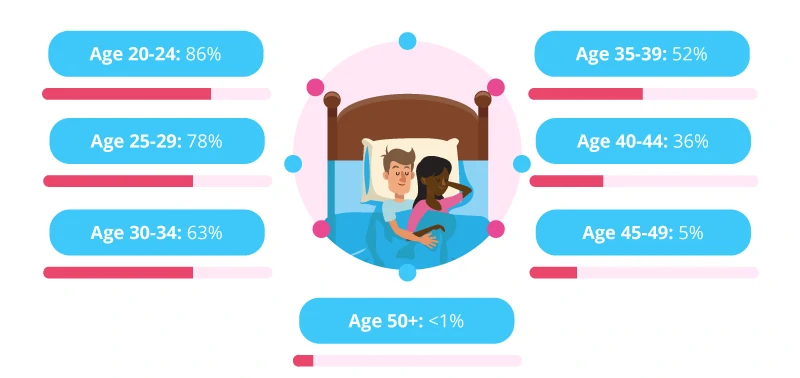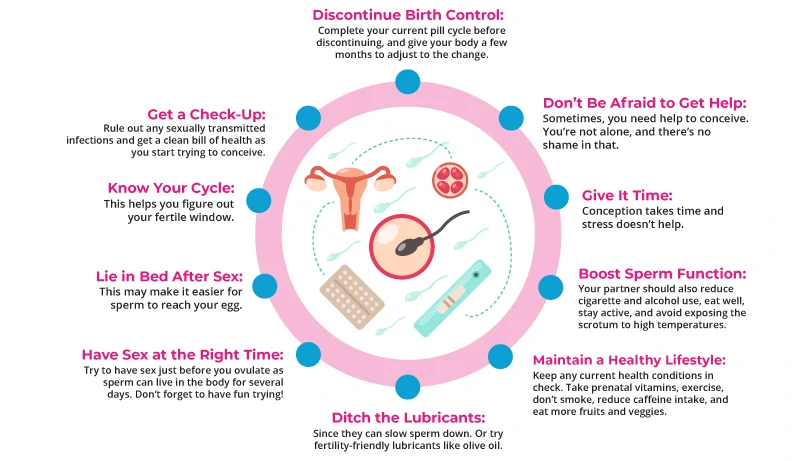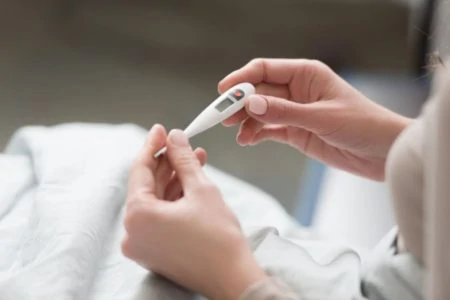Are you ready to start a family? Or maybe you’re looking to expand the one you already have? Deciding it’s time to have a child is an exciting chapter in your life.
When things don’t go as you’ve imagined they would, it can also be a frustrating time. Planning and being well-informed can give you the best leg up when it comes to getting pregnant.
Are you looking to increase your chances of getting pregnant quickly? In this guide, we will help you skip the frustrating parts of trying to conceive — and get you to your end goal as fast as possible.
How Quickly Can I Get Pregnant?
Interested in knowing the averages for how long it takes to get pregnant? Following are the rates of women who conceive naturally within a year of trying, broken down by age (1).
- Women aged 20 to 24 have an 86 percent chance.
- Women aged 25 to 29 have a 78 percent chance.
- Women aged 30 to 34 have a 63 percent chance.
- Women aged 35 to 39 have a 52 percent chance.
- Women aged 40 to 44 have a 36 percent chance.
- Women aged 45 to 49 have a 5 percent chance.
- Women older than 50 have less than a 1 percent chance.
There is no hard and fast rule for how long it takes to get pregnant, however. This is just a snapshot of the odds. Every woman — and every couple — is different.
Several factors play into how quickly conception takes place (2).
- Age: There’s not a strict time limit on when you’re able to conceive easily, but it is likely to happen more quickly when you’re younger. Working with a fertility specialist? You’ll likely find they’re willing to let you try without medical intervention longer, up to a year, when you’re younger. When you’re 35 years old and above, they typically want to intervene at the six-month mark.
- Health: Your overall health will play a big role in how quickly you’re able to conceive — and how easy your pregnancy will be. You should plan on eating right and exercising — and know that being underweight can impact conception just as easily as being overweight can. Plan on drinking less or having no alcohol, and to stop smoking.
- Reproductive health: While your general health will be a factor in your ability to conceive, your reproductive health will matter too. For women, irregular periods can indicate underlying reproductive issues. If you have reproductive health concerns, contact your doctor.
- How frequently you engage in intercourse: Having enjoyable, frequent sex is the gateway to conceiving. It’s recommended that couples trying to conceive have sex no more than once a day, but at least every other day.
The majority of couples conceive naturally within a year. Many women are even able to conceive within the first month of trying.
However, it’s perfectly normal not to get pregnant immediately, so don’t become discouraged if it takes you a few cycles.
Have a candid conversation with your doctor about any of your concerns. Depending on your age — and other factors — your doctor may want to start fertility testing or treatments earlier than the one-year mark.
How to Get Pregnant Fast
It’s true you can’t control how quickly you get pregnant. However, there are a few things you can do to increase your chances of getting pregnant faster.
1. Discontinue Birth Control
Using a hormone-based birth control like the pill? You’ll need to allow plenty of time between stopping your birth control and trying to conceive (3).
Plan on completing the full cycle of pills you’re on, so as not to confuse your body.
It’s possible your body might need a few months to regulate the hormones and resume ovulation. It’s also possible for you to resume ovulating immediately though.
If you are using an intrauterine device, you’ll need to make an appointment with your care provider to have it removed.
If you’ve been using condoms, spermicide, or other non-hormonal birth control methods, discontinue them when you’re ready to try to conceive.
Trigger Warning Miscarriage
New studies have changed the traditional counseling regarding how to proceed after experiencing a miscarriage. You should plan to try again when you feel emotionally and physically ready.
If you’ve recently experienced a miscarriage, studies show that becoming pregnant within three months is associated with the lowest risk of another miscarriage (4).
In fact, women who conceive within six months after their initial miscarriage have the best reproductive outcomes with the lowest frequency of complications (5).
2. Get a Check-Up
Don’t underestimate the importance of prep work. Getting a clean bill of health before conceiving can set you up for a healthy pregnancy. While it’s important to determine your partner is healthy enough for sexual activity, most of a preconception workup focuses on you.
If you’re planning on trying to conceive, your doctor can run some blood tests. These tests will help rule out any existing conditions that could make conception difficult or point to an underlying health problem.
When planning a pregnancy, always rule out any existing sexually transmitted diseases (STDs). These can impact your fertility — both in the short and in the long term.
Many STDs can also harm a developing pregnancy (6). If you do have an STD, make sure your partner is evaluated — and treated — as well.
During this visit, you’ll want to ask your doctor if you should be exercising more, or less if you tend to overdo it. Your doctor will likely suggest a change in your diet, including incorporating prenatal vitamins (7).
3. Know Your Cycle
Knowing and understanding your monthly cycle is one of the most important things you can do to increase your chances of conception (8).
The sooner you begin charting your cycle, the better. You’ll have more data points and a better understanding of when you’re likely to conceive.
Many women operate on a 28-day cycle, which will give you about five to six days a month when you are the most fertile.
To chart your fertility window, you’ll need to know the day your last period started. This is day 1 of your cycle.
When To Hit The Sheets
If you’re looking for more information on when you’re ovulating, you can also chart your basal body temperature. Studying your basal temperature using a basal body thermometer can help you more accurately pinpoint your ovulation (9).
Paying attention to your body can help clue you into where you are in your cycle. Tracking your basal body temperature is a great place to start — but it’s not the only thing your body can tell you about your fertility.
You can help anticipate when you’ll be ovulating by paying attention to how your cervical mucus changes throughout your cycle. If you notice you are experiencing more vaginal discharge than usual — especially if it’s watery and stretchy — you may be near ovulation.
Ovulation test strips are also available and can help make determining your fertility window a little easier.
4. Have Sex at the Right Time
Knowing when you’re ovulating — and therefore fertile — is the first step. Having sex during that window of fertility is the second (10).
Having sex before your expected ovulation can help account for any variation in when you ovulate. Sperm can also live in the body for several days — having some already in action can help increase your likelihood of conceiving.
Once you ovulate, there are only 12 to 24 hours for your egg to meet the sperm (11). If you know when you’ll be ovulating, you can have sex before ovulation. This can help ensure some of the slow-moving sperm will get to the egg on time.
If the sperm reach their final destination when you aren’t fertile, they won’t hang around. Have sex after ovulation to increase the odds for some of those fast-moving sperm to meet up with your egg.
Don’t forget to enjoy the process as you go along this wild ride. Stress doesn’t help with fertility so avoid the robot sex if at all possible. Orgasms improve the likelihood that sperm will successfully journey to your egg (12).

5. Lie in Bed After Sex
To help the sperm make their way to your egg, you can try staying in bed after you have intercourse. Standing and walking both allow gravity to work against you. Remaining in a neutral position in bed can give sperm a better chance of reaching your egg (13).
I used this trick with my pregnancies. Was it the deciding factor that allowed me to get pregnant? I don’t know, but it certainly didn’t hurt!
Menstrual cups may help with conception. Keep the cup on the nightstand to quickly insert after intercourse. This will keep the sperm close to the body in a warm, wet environment. While anecdotally, I’ve heard good things in practice- this is not evidence-based.
Editor's Note:
Caitlin Goodwin, MSN, RN, CNM6. Ditch the Lubricant
Lubrication may seem like a great idea when you’re trying to conceive. After all, you’re having sex with a purpose, and probably frequently. Lubrication can help with any soreness you’re experiencing.
However, lubricant can also impede the sperm’s progress (14). If you’re trying to conceive, skipping lubricant altogether will be the best way to avoid hindering sperm.
If you just can’t let lubricant go, consider a fertility-friendly option, like Pre-Seed Personal Lubricant.
Looking for something more natural? Canola oil, olive oil, and even egg whites can be used as a lubricant while trying to conceive (15).
7. Maintain a Healthy Lifestyle
In addition to taking those prenatal vitamins, opt for a balanced diet. You’ll want to plan on eating several servings of fruits and vegetables every day. You should also up your calcium intake.
Making smart choices about how you fuel and care for your body can set you up for conception and pregnancy.
Stay away from processed meats during this time. You’ll find pre-packaged meats are loaded with extra sodium and preservatives.
Fresh meat and produce, on the other hand, are packed with great vitamins and health benefits. Eat fish in moderation and choose fresh whenever possible.
In addition to your healthy diet, you’ll want to exercise regularly. Getting fit and staying strong will help prepare your body for the stress of pregnancy and labor.
You don’t have to join an aerobics class to reap the benefits. You can easily get your heart rate up and some quality health benefits from a simple walk after dinner.
It’s worth mentioning a few other items you’ll want to give up during your journey to try to conceive. Some of them may be more difficult than others, but they’ll make for a healthier pregnancy and may make conception easier.
- Don’t smoke: Smoking is never healthy, but especially has implications when you’re trying to conceive or are pregnant. It can prematurely age your eggs.
- Don’t drink: Having several drinks a week can lessen the likelihood of conceiving. It has fertility implications for men as well, so it’s best to skip alcoholic beverages altogether (16).
- Avoid excess caffeine: Caffeine in small amounts won’t hurt your ability to conceive. If you live in an extra-caffeinated state, however, it’s best to cut back before you’re even pregnant (17). It’ll be good practice for once you’re pregnant, and coffee and soda are recommended to be limited.
- Avoid artificial sweeteners: Recent studies are indicating there may be a link between infertility and using artificial sweeteners (18). If you’re trying to conceive, it may be in your best interest to stop using artificial sweeteners altogether.
- Avoid marijuana (and other drugs): As the states legalize marijuana, more women are partaking than ever before. Marijuana has detrimental effects on the reproductive system and the likelihood of becoming and staying pregnant (19). Males should abstain from all recreational drugs as it is a significant cause of male infertility (20).
Getting and staying healthy also means managing any existing health conditions you might have. Diabetes, high blood pressure, polycystic ovary syndrome, thyroid conditions, and autoimmune diseases can make conceiving and pregnancy difficult.
You may even be on medication that’s contraindicated for pregnancy.
Having a pre-existing condition doesn’t mean you can’t get pregnant. It does mean you may need to pay more attention to how your body is handling the pregnancy journey.
Work closely with your doctor as you may require additional attention with more frequent visits during your pregnancy.
8. Boost Sperm Function
When you’re trying to conceive, it’s easy to get caught up in all the things you need to do to become pregnant successfully.
There are two parts of the equation, though, and sperm is equally important to conceive successfully. For best results, you’ll want to change your habits while also boosting your partner’s sperm function.
Your partner isn’t exempt from healthy eating, either. Zinc, folic acid, and vitamins E and C are essential for sperm development. Having healthy sperm is critical if you’re looking to have a healthy pregnancy.
Your partner can start by making dietary changes and cutting back on alcohol and cigarettes. Here are a few other things he can do to keep sperm count and mobility up.
- Stay active: Exercise is just as important for your partner as it is for you. For optimal sperm production, get moving — exercise can help create important enzymes that protect sperm. A high BMI is also linked to a lower sperm count.
- Stay cool: It’s not a myth — sperm are sensitive to heat. You may be unintentionally damaging or killing sperm by exposing the scrotum to high temperatures. He should avoid hot tubs and hot baths, as well as keeping the laptop on his lap or his phone in his pocket.
- Avoid stress: Stress has a whole host of negative side effects. Not only can it decrease your sex drive, but it may also interfere with sexual function and impact needed hormones.
9. Give It Time
It would be great if you conceived the moment you were ready. It doesn’t often happen like that, though. It’s pretty common for it to take a few cycles to conceive successfully, six to 12 months on average, although earlier is not uncommon.
Try not to get discouraged during this early part of the process. Doing so can lead to frustration and stress. You may find you’re doing damage to your ability to get pregnant (21).
Have you been charting fertility for some months and still haven’t had success conceiving? It may be time to talk to your doctor.
10. Don’t Be Ashamed to Get Help
Your end goal in this process is to conceive and have a baby. There’s nothing to be ashamed about if you require additional help to make that possible. It’s likely a doctor will run some tests and do some imaging to determine if there’s an easy answer to your difficulty.
It’s possible there may even be more than one reason you’re experiencing difficulty conceiving. Both you and your partner should be thoroughly evaluated to determine the cause and to create a treatment plan.
If you’re over 35, you’ll want to seek help after trying unsuccessfully to conceive for six months. If you’re under 35, you should plan on trying for a full year before seeing your doctor.
Your doctor can help you through this process — or refer you to a specialist if needed. You aren’t alone in struggling to conceive. Fortunately, there are plenty of options out there to help you.












